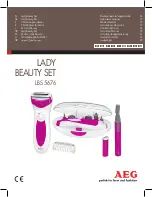
SomnoGuard
®
and SomnoGuard
®
2.0
Medical oral appliances to treat snoring and sleep apnoea in adults
Content: monobloc mouthpiece, filler material, wooden spatula, storage case and user instructions
It is recommended that the SomnoGuard
®
mandibular advancement devices are fitted by physicians (e.g., ENT doctors, sleep lab doctors or
dentists) or their trained medical staff. A video CD-ROM entitled "SomnoGuard
®
- Fitted by an Expert" is available from Tomed or your local
supplier showing the major steps in fitting the SomnoGuard
®
and SomnoGuard
®
2.0. The CD runs on all PCs using Windows.
Instructions (
Read instructions carefully before use)
Date of information: 8 July 2009
Description:
SomnoGuard
®
and SomnoGuard
®
2.0 are prefabricated one-part mandibular advancement devices made from thermoplastic copolymers. The upper part of
the oral appliance is characterised by a notch (see figures 1 and 2 on the box). When heated in a hot water bath the oral appliance becomes soft and
mouldable and is then fitted to the teeth of the upper and lower jaws. Once the appliance has shortly cooled after fitting, it will show a distinct impression of
the teeth over the whole of the mouthpiece (see figure 2 on the box). SomnoGuard
®
2.0 differs from SomnoGuard
®
because of a 1.5 mm thickened molar
biting zone on each side and an increase in the height of the molar side wall by 1 mm. As opposed to the classic SomnoGuard
®
use of the filling strip can
thus be avoided when SomnoGuard
®
2.0 is used by patients with a "deep bite”. An opening in the front part of the mouthpiece allows you to breathe through
the mouth (if necessary) in an emergency situation. However using the 2-part appliance “SomnoGuard
®
AP” enables you to breathe through your mouth
whenever you need to do so.
Indications:
- Primary snoring and mild to moderate obstructive sleep apnea in adults
- Sporadic use by patients with obstructive sleep apnoea instead of nCPAP when travelling according to the advice of their medical professional.
Contraindications:
If any of the following conditions exist, seek advice from a medical professional before using this appliance:
- Central sleep apnoea
- Mandibular joint disorder
- (Strong) gag reflex, larger gaps between the teeth, unstable dental crowns, decay, parodontosis
- Limited mandibular advancement. Patients with sleep apnoea should be able to extend their lower jaw forward at least 7mm.
- Restricted breathing through the nasal passages
If the patient’s dental condition appears uncertain and in case of occlusal abnormalities (e.g. crossbite, overbite, underbite) a check up visit with a dentist is
necessary and strongly recommended prior to the start of treatment.
Possible side effects:
- Initial hypersalivation which normalises with adaptation to the appliance.
- Morning discomfort by temporary pain from TMJ or teeth, reducing commonly with adaptation
- Mouth dryness
- During the first days it may happen that the device cannot be kept in the mouth for the whole night. This is normal. The adaptation may take 1 to 2 weeks.
In case of any persisting or severe side effects stop using the appliance immediately and consult your medical professional.
Mode of action
The series of SomnoGuard
®
oral appliances has been developed to reposition the lower jaw and thereby the base of the tongue forward. Due to the
advanced lower jaw position the upper airway is wider and you can breathe more easily with the snoring sounds being reduced.
The fitting process
Preparation:
1. The pack includes a wooden spatula. Push the spatula through the hole in the mouthpiece so that its tip protrudes out of the back by a few millimetres.
This spatula helps you to hold the mouthpiece with your fingers while fitting.
2. First put the unfitted mouthpiece into your mouth with the spatula pointing away from your face. The upper part of the mouthpiece has a notch in it. The
upper part of the mouthpiece forms the biting channel for the upper jaw, the lower part the biting channel for the lower jaw.
3. Before doing the real fitting, practise the process with cold water. Put the mouthpiece in the unheated water, as you will have to do later with hot water for
the actual fitting. If you fit the device yourself practise in front of a mirror. The timing is critical. Make sure you use a watch with a second hand that you can
read easily.
Custom-Fitting:
1. Boil about 1 litre of water in a saucepan. The water must be deep enough to completely cover the mouthpiece.
2. Take the pan off the hob and immerse the appliance with the wooden spatula in a sloping but not vertical position. Whilst immersed in the hot water, move
and turn the appliance with the spatula. Differentiate between fitting SomnoGuard
®
or SomnoGuard
®
2.0 as follows:
SomnoGuard
®
People with considerable fitting experience should immerse the oral appliance for 25 to 35 seconds to achieve an optimal teeth and jaw impression into the
plastic. However, those who have limited or no fitting experience should immerse the SomnoGuard
®
in the hot water for no longer than 20 to 25 seconds as
this reduces the risk of the inner and outer walls of the appliance sticking together. After heating, the mouthpiece will appear transparent. Gently feel the
biting channel to check that the plastic is mouldable. In the heating process be careful that the inner and outer sides of the appliance do not stick together. If
necessary take the appliance briefly out of the hot water (using the spatula) and push the sides back to their original position with your fingers.




















